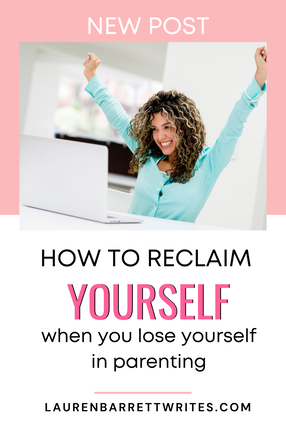|
Running. Writing. Reading. Traveling. Scrapbooking. Yoga. Volunteering. Those were some of my many passions and hobbies in life that gave me great fulfillment prior to having a baby. I nourished each one of those on the regular. By the time my son was born, I was down to reading and doing something that might be called running (but was more like shuffling) from my List of Passions. Oh, and shoveling food down my face with one hand if that counts. As a new mom, I knew that life would be altered once I had a baby. I fully expected that I would have to give up some of the hobbies that I so enjoyed before, and I was okay with that. I threw myself into motherhood with all the zest and joy I had for my other passions. What I didn’t expect was the mental load. It made me bitter. It made me feel as if I was carrying the weight of this new baby all on my shoulders. Why were there so many decisions to make and why did I feel as if I were the one making them all? Mental load consumed my thoughts throughout the day and left me run ragged at night with little or no time for myself. I was floundering. After a few months in, I knew something had to change. I knew I had to reclaim my Unicorn Space. Lauren Barrett Writes is a participant in the Amazon Services LLC Associates Program, an affiliate advertising program. As an Amazon Associate, I earn from qualifying purchases. Read more about these links in my disclosure policy. What is your Unicorn Space?
|
|
|
|
But first, what is Fair Play? Fair Play is a book written by Eve Rodsky. The book also inspired a card game to play with your partner
Taken straight from Fair Play’s website:
Tired of being the “she-fault” parent responsible for all aspects of her busy household, Eve Rodsky counted up all the unpaid, invisible work she was doing for her family—and then sent that list to her husband, asking for things to change. His response was . . . underwhelming. Rodsky realized that simply identifying the issue of unequal labor on the home front wasn’t enough: She needed a solution to this universal problem. Her sanity, identity, career, and marriage depended on it.
The result is Fair Play: a time-and anxiety-saving system that offers couples a completely new way to divvy up domestic responsibilities. Rodsky interviewed more than five hundred men and women from all walks of life to figure out what the invisible work in a family actually entails and how to get it all done efficiently. With four easy-to-follow rules, 100 household tasks, and a figurative card game you play with your partner, Fair Play helps you prioritize what’s important to your family and who should take the lead on every chore from laundry to homework to dinner.
Fair Play made sense to me after reading it. Something clicked.
Maybe if James and I could physically see how many cards each of us held, we would realize all that the other did and work to make our household responsibilities fairer and alleviate some of my mental load.
I knew I had to give it a shot.
I liked how there were concrete rules:
I liked how there were different categories for the 100 household tasks:
I liked how Eve offered solutions to the 13 mistakes couples will make.
And I was pretty sure James would appreciate the overall efficiency of the game. Now, I just had to get him to play.
Taken straight from Fair Play’s website:
Tired of being the “she-fault” parent responsible for all aspects of her busy household, Eve Rodsky counted up all the unpaid, invisible work she was doing for her family—and then sent that list to her husband, asking for things to change. His response was . . . underwhelming. Rodsky realized that simply identifying the issue of unequal labor on the home front wasn’t enough: She needed a solution to this universal problem. Her sanity, identity, career, and marriage depended on it.
The result is Fair Play: a time-and anxiety-saving system that offers couples a completely new way to divvy up domestic responsibilities. Rodsky interviewed more than five hundred men and women from all walks of life to figure out what the invisible work in a family actually entails and how to get it all done efficiently. With four easy-to-follow rules, 100 household tasks, and a figurative card game you play with your partner, Fair Play helps you prioritize what’s important to your family and who should take the lead on every chore from laundry to homework to dinner.
Fair Play made sense to me after reading it. Something clicked.
Maybe if James and I could physically see how many cards each of us held, we would realize all that the other did and work to make our household responsibilities fairer and alleviate some of my mental load.
I knew I had to give it a shot.
I liked how there were concrete rules:
- All Time is created equal.
- Reclaim your right to be interesting.
- Start where you are now.
- Establish your values and standards.
I liked how there were different categories for the 100 household tasks:
- Home
- Out
- Caregiving
- Magic
- Wild
- Unicorn Space
I liked how Eve offered solutions to the 13 mistakes couples will make.
And I was pretty sure James would appreciate the overall efficiency of the game. Now, I just had to get him to play.
How We Did Fair Play?
I knew if I wanted to get James to play I couldn’t make Fair Play out to be a gigantic lecture or like I was out to get him.
So, I sent him an invitation inviting him to play and empathized that there would be food and drinks served. He thought that was cheesy but RSVPed that he would go and actually showed up to our living room after our son went to bed.
This is how we played.
1. We laid out all the cards and began taking out the ones that don’t apply to us right now. (i.e. taking care of a pet, helping with your child’s homework)
2. I handed out the remaining cards to what we currently do. This is something you don’t have to do, but I wanted James to see how many cards I actually had.
*Eve advises you to not keep score, but I felt obligated to let him know all the invisible work I do hehe*
3. Lay out the cards again. Now this time take turns picking out the Daily Grind cards.
Some cards have a small coffee cup listed next to them. That signifies Daily Grind. These are the responsibilities that most likely have to take place every day (dishes, making dinner, putting kids to bed).
One partner should not hold all the Daily Grind cards. They should be distributed fairly.
In our household, James is in charge of all things food, cooking, groceries, meal-prepping, and takeout. I am in charge of cleaning and putting Henry to bed most nights, waking him up in the morning, and handling his naps. It’s our preference.
4. Now, sort out the remaining cards. First, we started by preference and then we negotiated the cards we didn’t want.
Remember just because you have a card now, it doesn’t mean that you are stuck with it forever. You can resort every week or month.
And also remember that some cards can be Doubled-Up - when partners “share” one card.
5. Draw your Friendship, Self-Care, and Unicorn Space cards.
Each partner gets these cards and should be allotted time to nourish these cards. When you draw these cards, you should establish how often and when that will happen.
For example, my Unicorn Space is writing and blogging and James’ Unicorn Space is trading. Wednesday nights James handles the bedtime routine, so I can have extra time or sometimes James will take Henry to the grocery store with him.
6. Go over CPE.
CPE stands for conception, planning, and execution. This is very important.
It means that if you have a certain card, you are in charge of CPE.
For instance, if I have the card of Extracurricular and Packing/Unpacking (a card pairing that should go together), it is my responsibility to sign up/pay for my son’s swim lessons, mark it on the calendar, plan how I am getting him there, pack his bags, and unpack them when I get back.
James doesn’t have to do anything except ask how it went.
Another example, if James has the bedtime routine for the night, he is in charge of it all. The full CPE. I shouldn’t have to think about it at all.
Because we all know that women spend a great amount of time conceiving and planning something but yet our partners will take credit for the task if they execute it.
No, no. Not with Fair Play. If you have the card, you CPE it.
Of course, there are extreme circumstances where you have to break down CPE, but Eve advises against it.
7. Go over your Minimum Standard of Care.
Your partner won’t do things quite like you do it and vice versa, and that’s okay, but there needs to be a Minimum Standard of Care established.
For example, I am a little extra with the Bedtime Routine. Henry and I have our own thing. I shouldn’t expect James to do all that I do.
BUT, the Minimum Standard of Care in our household is that he has to at least brush his teeth, read a book, say prayers, and sing a song. And I need to be okay with that.
Establish a Minimum Standard of Care for anything you are concerned your partner won’t meet expectations and vice versa.
8. Make a list of who has what and play fairly.
Now, it’s time to play fairly. So far, it is working for us. We know our roles, and we have stuck with them.
9. Redraw when necessary.
We haven’t had to redraw, but I am sure we will soon now that summer is almost over, and teaching and coaching are starting soon. We are also moving, so some new roles will need to be established.
So, I sent him an invitation inviting him to play and empathized that there would be food and drinks served. He thought that was cheesy but RSVPed that he would go and actually showed up to our living room after our son went to bed.
This is how we played.
1. We laid out all the cards and began taking out the ones that don’t apply to us right now. (i.e. taking care of a pet, helping with your child’s homework)
2. I handed out the remaining cards to what we currently do. This is something you don’t have to do, but I wanted James to see how many cards I actually had.
*Eve advises you to not keep score, but I felt obligated to let him know all the invisible work I do hehe*
3. Lay out the cards again. Now this time take turns picking out the Daily Grind cards.
Some cards have a small coffee cup listed next to them. That signifies Daily Grind. These are the responsibilities that most likely have to take place every day (dishes, making dinner, putting kids to bed).
One partner should not hold all the Daily Grind cards. They should be distributed fairly.
In our household, James is in charge of all things food, cooking, groceries, meal-prepping, and takeout. I am in charge of cleaning and putting Henry to bed most nights, waking him up in the morning, and handling his naps. It’s our preference.
4. Now, sort out the remaining cards. First, we started by preference and then we negotiated the cards we didn’t want.
Remember just because you have a card now, it doesn’t mean that you are stuck with it forever. You can resort every week or month.
And also remember that some cards can be Doubled-Up - when partners “share” one card.
5. Draw your Friendship, Self-Care, and Unicorn Space cards.
Each partner gets these cards and should be allotted time to nourish these cards. When you draw these cards, you should establish how often and when that will happen.
For example, my Unicorn Space is writing and blogging and James’ Unicorn Space is trading. Wednesday nights James handles the bedtime routine, so I can have extra time or sometimes James will take Henry to the grocery store with him.
6. Go over CPE.
CPE stands for conception, planning, and execution. This is very important.
It means that if you have a certain card, you are in charge of CPE.
For instance, if I have the card of Extracurricular and Packing/Unpacking (a card pairing that should go together), it is my responsibility to sign up/pay for my son’s swim lessons, mark it on the calendar, plan how I am getting him there, pack his bags, and unpack them when I get back.
James doesn’t have to do anything except ask how it went.
Another example, if James has the bedtime routine for the night, he is in charge of it all. The full CPE. I shouldn’t have to think about it at all.
Because we all know that women spend a great amount of time conceiving and planning something but yet our partners will take credit for the task if they execute it.
No, no. Not with Fair Play. If you have the card, you CPE it.
Of course, there are extreme circumstances where you have to break down CPE, but Eve advises against it.
7. Go over your Minimum Standard of Care.
Your partner won’t do things quite like you do it and vice versa, and that’s okay, but there needs to be a Minimum Standard of Care established.
For example, I am a little extra with the Bedtime Routine. Henry and I have our own thing. I shouldn’t expect James to do all that I do.
BUT, the Minimum Standard of Care in our household is that he has to at least brush his teeth, read a book, say prayers, and sing a song. And I need to be okay with that.
Establish a Minimum Standard of Care for anything you are concerned your partner won’t meet expectations and vice versa.
8. Make a list of who has what and play fairly.
Now, it’s time to play fairly. So far, it is working for us. We know our roles, and we have stuck with them.
9. Redraw when necessary.
We haven’t had to redraw, but I am sure we will soon now that summer is almost over, and teaching and coaching are starting soon. We are also moving, so some new roles will need to be established.
Get out there and play!
Both James and I have been very happy with Fair Play. We each feel more valued and less stressed. My mental load has decreased, and I am relishing in my Unicorn Space.
Fair Play is something you need to play for life. It ultimately increases your communication as a couple and makes you feel like a team.
James and I even high-fived after playing. Something he doesn’t let me do a lot because he says I am too eager for it.
So you know Fair Play is a win!
Fair Play is something you need to play for life. It ultimately increases your communication as a couple and makes you feel like a team.
James and I even high-fived after playing. Something he doesn’t let me do a lot because he says I am too eager for it.
So you know Fair Play is a win!
|
Lauren Barrett was born in New Jersey, grew up in West Virginia, went to college in Pennsylvania, and now lives and works in North Carolina. She is a high school teacher of the Deaf and hard-of-hearing by day, a cross country coach by the afternoon, a writer by her son's nap times, and a full time mom to an amazing toddler. She loves her faith, running, visiting MLB stadiums with her husband, chocolate, scrapbooking, pretending she would actually do well on the Amazing Race, re-watching The Office, listening to Bobby Bones, and helping out all moms. She lives in North Carolina with her husband, James, and son, Henry.
|
0 Comments
Leave a Reply.
|
|
|
|
Categories
All
Add One A Day 30 Day Challenge
Add One-A-Day 30 Day Challenge
Baby
Blogging
Life
Marriage
Mom
Parenting
Positive Parenting Discipline
Pregnancy
Raleigh
Running
Social Justice
Teacher
Toddler Eating
Travel
Vocabulary
Wedding
Writing
Proudly powered by Weebly







 RSS Feed
RSS Feed